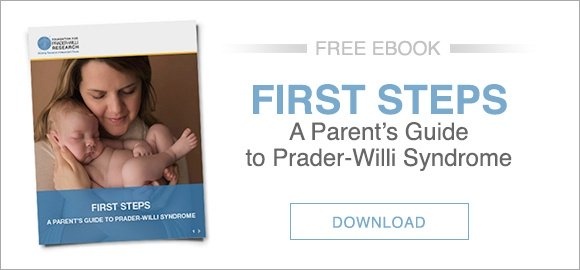In just 3 minutes, FPWR's new video, What Is Prader-Willi Syndrome?, explains the basics of PWS — how it occurs, some of the challenges of PWS, and promising research into treatments. Narrated by Susan Hedstrom, Executive Director of FPWR and the parent of a child with PWS, it features many photos of people with PWS and their families — and it ends with a message of hope.
You can watch the full video here, and read a transcript below; the video is also featured on FPWR's What Is Prader-Willi Syndrome web page.
Transcript:
This video briefly explains what PWS is — including how it occurs, some of the challenges of PWS, and promising research into treatments. Prader-Willi syndrome (PWS) is a rare disorder that occurs in about 1 in 15,000 births. It affects males and females, as well as all ethnicities, with equal frequency.
PWS is a neurodevelopmental disorder. It’s caused by the loss of active, paternally inherited genetic material on chromosome 15. Infants with PWS may be identified shortly after birth on the basis of a weak cry, hypotonia (low muscle tone), undescended testes in males, and difficulty feeding. Suspected PWS can be confirmed by a DNA test, which detects PWS with greater than 99% accuracy.
Babies with PWS typically require an NG or G tube, special bottles and extended feeding times. Careful monitoring is necessary since some babies may experience failure to thrive. It is recommended to begin growth hormone as soon as possible. Sometime after age 2, a child with PWS will start to gain weight very easily, and may have a heightened focus on food. Increased appetite usually starts during childhood and can be gradual. Research is currently underway to find treatments for PWS, but for now, controlling the child’s access to food is the only intervention available to manage hyperphagia (excessive hunger).
PWS is a spectrum disorder. Not every person with PWS will face every challenge that PWS can present. Some of the challenges that people with PWS may face include: high levels of anxiety and cognitive rigidity, growth hormone deficiency, incomplete sexual development, thyroid deficiency, developmental delay, intellectual disability, respiratory problems, sleep disturbances, poor bone health, scoliosis, decreased sensitivity to pain, poor control of body temperature, gastrointestinal issues including decreased motility and gastroparesis, self-injurious behavior such as skin picking, increased risk of central adrenal insufficiency, seizures, hypoglycemia, and mental illness.
It can be overwhelming to see the list of challenges PWS may present. But as a parent of a child with PWS, I can tell you — we have hope! Thanks to research funded through FPWR over the past 10 years, we now have more clinical trials for PWS coming down the pipeline than ever before. The future of our children is full of opportunity. If your child has PWS, there are resources and a community to help you. Start by downloading First Steps: A Parent's Guide to Prader-Willi Syndrome.







